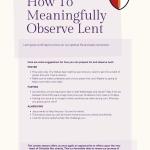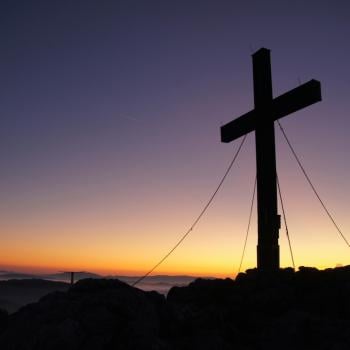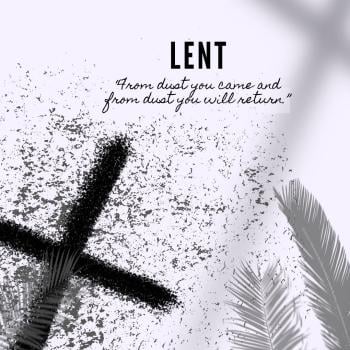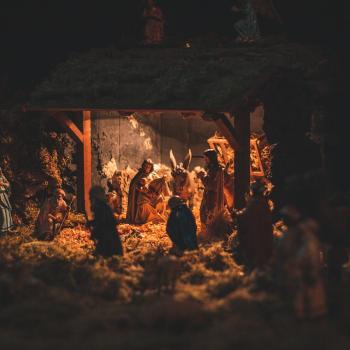Lent is upon us once again, with its three areas of focus comprising, prayer, fasting, and almsgiving. Since the Holy Father has announced the theme of this year to be prayer, it makes sense to place it at the top of our priority list this Lenten season. I enjoy the practice of following one of the Old Testament figures each Lent, as a preparation for celebrating the Passion and Death of Jesus. If we hone in on just one figure from the Old Testament every year as our special guide and company during Lent, it will not take long to develop a deeper knowledge of Sacred Scripture and be better equipped to gain spiritual fruit from this special time period. The prophet Elijah helps us to live Lent in prayer, fasting, and almsgiving.
The prophets, with their teaching and their preaching, had great importance in the religious history of ancient Israel. Among them the figure of Elijah stands out, impelled by God to bring the people to conversion. His name means “the Lord is my God”, and his life develops in accordance with this name, entirely dedicated to kindling in the people gratitude to the Lord as the one God (Pope Benedict XVI, 15 June 2011).
Elijah as a Spiritual Guide for Lent
We should take Elijah the Tishbite as our spiritual guide during this Lent, as he is a master of prayer and he has a certain Eucharistic symbolism that goes well with our lead-up to the National Eucharistic Congress in Indianapolis this July. Elijah is one of the more iconic and powerful prophets of the Old Testament, despite the fact that his body of writings has not survived.
We find his life recorded in the Book of Kings, where we learn about him ministering in the northern kingdom of Israel. His prophetic role can give us clues about how to live in our own time of social turmoil. To be a prophet is not simply to foresee the future, but rather to read the signs of the times and pray to God for guidance to direct our actions. Through our baptism, we are all called to be “priests, prophets, and kings.” Each one of us is called to be prophetic, reading the signs of the times according to the light of the Gospel. (cf. Gaudium et Spes, 4) In Baptism,
the anointing with sacred chrism, perfumed oil consecrated by the bishop, signifies the gift of the Holy Spirit to the newly baptized, who has become a Christian, that is, one “anointed by the Holy Spirit”, incorporated into Christ who is anointed priest, prophet, and king. (Catechism of the Catholic Church, 1241).
Baptismal Commitment
Our baptism commissions us to read the signs of the times and to interpret them in light of the Gospel. Reflecting on the life of Elijah and his prophetic outlook can help us gain a prophetic viewpoint of our world and society. Elijah did not pray for special gifts, but instead responded to the situation of the world in which he was living. God gave him special gifts as a grace, not as a command.
Who is Elijah?
Elijah lived in the northern kingdom of Israel during the reigns of Ahab and Ahaziah, and we can find his story recounted in 1 Kings 17-19 and 2 Kings 1-2. He defended the pure worship of the Lord against religious syncretism (the mixing in of elements from other religions) promoted by Ahab and the evil queen Jezebel. He had to do battle with pagan cults, particularly the cult of Baal. God granted him the power to work miracles for the purpose of recovering the people of Israel that had fallen into idolatry. In fact, Elijah’s face-off with the false prophets of Baal is one of the most tremendous scenes in the entire Old Testament.

Eucharistic Elements of Elijah
The Eucharistic symbolism of Elijah shines forth in three miraculous feedings: he was fed by ravens (1 Kings 17:6), by a widow when she no longer had enough flour (1 Kings 15), and he received food from an angel to strengthen him on his journey into exile (1 Kings 19:5). These miraculous feedings recall a parallelism with the Eucharistic focus that our Lent can take. If God was so focused on taking care of Elijah when he was in danger of death from starvation, how much more does he care for our spiritual well-being by providing us with the Eucharist each and every day?
Summary of the Elijah Cycle
God called Elijah to stand up to King Ahab so that he could re-establish right worship in the land of Israel. Elijah proclaims a drought as a punishment for idolatry. His confrontation with the king begins his wandering away from the kingdom to escape the wrath of the king. At this point, the struggle seems private, since Elijah still receives sustenance in exile, first through the miraculous feeding through the ravens and then through the widow at Zarephath.
Renewed Conflict with Ahab
The conflict becomes more public three years later when Elijah challenges Ahab through the royal servant Obadiah. (1 Kings 18:1-17) Pagan prophets established the cult to the foreign, pagan god Baal at Mount Carmel, so Elijah felt moved by God to face them and show the true nature of their idol. All the land had been suffering from drought for the three years preceding, and this sets the scene for the drama that follows. Elijah sets up an altar and offers sacrifice to the Lord, asking the Lord himself to light the fire for the holocaust offering.
The prophets of Baal scamper about hopelessly and ridiculously, trying to match the prayerful power of the true prophet. The hopping and gashing of the false prophets serve as a considerable contrast to the prayerful peacefulness of Elijah, allowing onlookers to see that the God of Israel is real and that he is not Baal. Meanwhile, when Elijah asks for fire, God sends the fire, answering his prayer. Finally, Elijah appeals to the Lord and rain returns to the land. (1 Kings 18:18-46)
Worship of an idol, instead of opening the human heart to Otherness, to a liberating relationship that permits the person to emerge from the narrow space of his own selfishness to enter the dimensions of love and of reciprocal giving, shuts the person into the exclusive and desperate circle of self-seeking (Pope Benedict XVI, 15 June 2011).
Confrontation with the Prophets of Baal
Elijah uses the event to draw the people of Israel back to the Lord. He is a great model of prayer of intercession and of liturgical prayer, praying for the people and setting up an altar for the sacrifice. Following the humiliation of the king’s prophets, Elijah is forced to flee the wrath of Jezebel and sets out for Horeb, known also as Sinai. Sometimes, to find God, we have to set out for the mountains just as Elijah did. At this place of higher elevation and solitude, we can find both a symbolic closeness to the heavens and a true aloneness with God.
For this reason, the great mount of the Ten Commandments becomes a place for encounter with God for the prophet Elijah. Only in a place such as Mount Sinai could Elijah learn something so important about the nature of God, who reveals himself not by tempests, fire, or earthquakes, but in a gentle whisper (1 Kings 19:11-12). Following the revelation of God on the mountain, Elijah anoints Elisha as his successor. (1 Kings 19:15-18)
Defense of Naboth
The Tishbite stands for justice under the Mosaic Law when he defends the land ownership rights of ordinary Israelites against the murderous land-grabbing carried out by Ahab against Naboth at the urging of the queen Jezebel. Assuming his power to be justified absolutely, Ahab has seen fit to trample upon the rights of his people, at the urging of his evil queen Jezebel. Their unjust actions will draw down the wrath of God and lead to the downfall of the house of Ahab.
A running theme throughout the Old Testament is that the God of Israel is the only true God, although time and again the people of Israel turn away from him. Within the story of Elijah, God makes it clear that he will not be mocked, and Elijah predicts to Ahaziah that he will die because of his dependence on Baalzebub, the foreign god of Ekron. When the king sends two companies of soldiers to arrest the prophet, they die by lightning, showing that God protects his own. The life of Elijah was often harrowing, but he was always protected by the loving providence of God. His disciple Elisha witnessed his ascent into heaven carried by a chariot of fire and horse of fire.
Moral Lessons from Elijah
We should reflect on the things in our lives that feel like a standoff with the powers of evil. The secular world tries to invade and take over our spiritual life frequently. We can feel bombarded by attacks of evil but must never lose hope; the life and testimony of Elijah teaches us about this hope and that we must not dialogue with evil. There are so many ways that evil creeps into our life, but it is important for us to stand up for what is right, even at great personal cost.
Spiritual Lessons from Elijah
This prophet was above all else a man of prayer, and this prayer led him to act on behalf of God and true religion. Elijah uses the standoff with the prophets of Baal to draw the people of Israel back to the Lord. He is a great model of intercessory and liturgical prayer, praying for the people and setting up an altar for the sacrifice.
He shows us what it means to have tremendous trust in God. Despite facing the evil king and queen and having to flee into exile, he always trusts God and is rewarded in concrete ways for his faithfulness. He never focuses on the miraculous aspect of things, however, but instead practices a perfect detachment because his only desire is to serve God and love him with all his heart.
Knowing that prayer is one of the primary activities of Lent alongside fasting and almsgiving, it is good to look at two events from Elijah’s life to understand why he is such a great figure for getting into the meaning of Lent. His prayer reminds us of the intercessory and liturgical types of prayer, even when his personal dialogue with God is overwhelmingly his principal form of prayer. His forty days walking through the desert remind us of the forty days Jesus spent suffering temptation in the desert.
Return of Elijah?
In the Gospel, we hear several times of people clamoring about the return of Elijah and we understand quickly that the ministry of John the Baptist is a direct continuation of the mission of Elijah. The rumors of Elijah’s return surfaced on account of the telling of his miraculous translation into heaven. God calls each one of us to be like Elijah and John the Baptist, preparing the way of the Lord.
Although Lent does not have the feeling that we are not preparing for the coming of the Lord in the same way as Advent, Elijah does set us up for a spirit of expectation, proper to the entire Old Testament awaiting its fulfillment with the coming of Christ. His struggles with contemporary culture echo in our heart as we face a secularized world that seems to have no place for God. Remembering his struggles but also the special graces given him by the Lord help us to have the courage we need to be prophetic witnesses, strengthened by the Eucharist and confident in God.
Do you already have a Lenten program? Share your thoughts below.
Subscribe to the newsletter to never miss an article.














